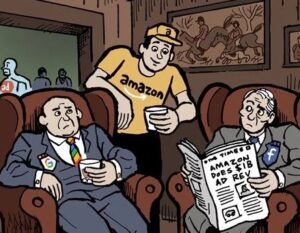Here’s today’s AdExchanger.com news round-up… Want it by email? Sign up here.
Tricks Of The Trade Desk
Anxiety has been brewing among publishers since The Trade Desk’s most recent earnings report.
CEO Jeff Green used the call as an opportunity to reframe TTD’s focus away from championing “the open web” writ large toward support of a new concept, what he referred to as “the premium internet.”
Why should publishers care?
Well, many fear that TTD’s newfound inventory quality controls may exclude their own sites, Digiday reports.
For TTD, “premium” is primarily a synonym for “plugged into UID2.” Publishers therefore fear TTD may throw its weight around to force the digital media industry to adopt UID2, as well as TTD’s single sign-on tool, OpenPass (not to be confused with OpenPath, TTD’s direct buying hub for media sellers).
The thing is, TTD gets much better data when publishers put its code on their pages. It sees how many ads were served on the page, where they were placed and lots of other little details about the user and the URL that otherwise aren’t conveyed to a DSP.
“Why should publishers like us give ad tech vendors like this our data so they can make a markup from it?” says one anonymous exec. “It’s extremely arrogant from the ad tech side.”
A New Netflix
Netflix hopes to tempt advertisers with its own ad server. But buyers are as yet unpersuaded.
Specifically, buyers are unimpressed with Netflix’s attribution reporting, according to Adweek.
Agencies want impression reporting tied to actual business outcomes and to compare their Netflix ads with campaign performance on other streaming platforms. But right now, buying ads on Netflix “is like buying ads on a website circa 2005” because of limited attribution and a lack of programmatic availability, says Horizon Media SVP Mike McCarver.
But, while Netflix starts making supply available through other SSPs and DSPs (starting with Magnite, The Trade Desk and DV360), a centralized ad server would allow Netflix to manage bid requests through different supply paths, thus minimizing bid duplication. And alongside new partnerships with outcomes-based measurement providers, the new ad server should, in theory, offer buyers more visibility into where ads run on Netflix and how campaigns perform across platforms.
However, this level of visibility depends on how transparent Netflix chooses to be. Show-level reporting is just one example of the type of transparency buyers demand from all connected TV publishers, seemingly to no avail.
Pay-to-PlayPal
Another new ad network just dropped!
PayPal is launching an ad targeting and data sales business, The Wall Street Journal reports.
To head its ads biz, PayPal has hired Mark Grether, who joined Uber in 2022 to jumpstart the ride-sharing app’s ads business.
Just like Uber – which has since raced to profitability with a big assist from ad revenue – PayPal needs advertising to get out of a severe rut. (Its shares have hovered in the $6 to $70 range for years, down from above $300 in 2021.) Plus, Chase, Mastercard, Experian and other banks, credit-reporting and payment companies are doing it, so why not?
But PayPal wants to expand its pool of advertising clients beyond brands that use its payment platform, which is why it’s branching into data sales. PayPal, which owns Venmo and the shopping browser extension Honey, has oceans of purchase data.
Venmo also recently began running non-targeted ads, so there’s some precedent. But, per a PayPal spokesperson, the company wants to avoid alienating Venmo’s younger users with too much advertising.
As a data seller, not just an inventory supplier, PayPal could play a valuable role as a scaled source of attribution data for other ad platforms. As of now, Shopify is pretty much the only other player with that much first-party purchase data available to other platforms.
But Wait, There’s More!
There’s been a major leak of seemingly authentic internal info on the Google Search ranking system. [Search Engine Roundtable]
Klarna cuts agency expenses by 25% using AI. [Ad Age]
You’re Hired!
Ex-OpenAI safety lead Jan Leike will head up a new safety team at Anthropic. [Bloomberg]
Chicory names Stacey Hafers as its first Chief Financial Officer. [release]














